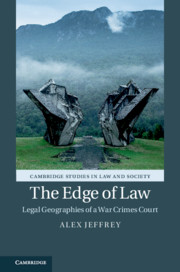Book contents
- The Edge of Law
- Cambridge Studies in Law and Society
- The Edge of Law
- Copyright page
- Contents
- Acknowledgements
- Abbreviations
- Chapter One The Edge of Law
- Part I Producing the Edge of Law
- Chapter Two Making a Court
- Chapter Three Court Materiality
- Part II Politics at the Edge of Law
- Part III Contesting the Edge of Law
- Bibliography
- Index
- Cambridge Studies in Law and Society
Chapter Two - Making a Court
from Part I - Producing the Edge of Law
Published online by Cambridge University Press: 11 December 2019
- The Edge of Law
- Cambridge Studies in Law and Society
- The Edge of Law
- Copyright page
- Contents
- Acknowledgements
- Abbreviations
- Chapter One The Edge of Law
- Part I Producing the Edge of Law
- Chapter Two Making a Court
- Chapter Three Court Materiality
- Part II Politics at the Edge of Law
- Part III Contesting the Edge of Law
- Bibliography
- Index
- Cambridge Studies in Law and Society
Summary
The Court of Bosnia and Herzegovina (CBiH) occupies an unimposing building around five kilometres outside the centre of Sarajevo (Figure 2.1). In many respects it defies the assumed characteristics of public legal buildings, imagined to present an imposing presence on the urban landscape to symbolically embed a particular legal regime. On a cold October afternoon, sitting with a member of the Public Information and Outreach Service (PIOS) at the court, I asked about the selection of the building and, specifically, why this site had been chosen for the court. Finishing her cigarette with the hint of a smile, she replied that ‘all the good buildings in the centre of town had been taken by other international agencies’. This dry remark reflects the timing of the CBiH’s establishment in 2005, 10 years after the Dayton Agreement and late in the process of BiH state formation. It also points to a process of articulation, where a new institution inevitably reflects the existing landscape of governmental and legal authority. We cannot, then, understand the making of the CBiH without first grasping the geopolitical and historical circumstances that produced its mandate and structure.
- Type
- Chapter
- Information
- The Edge of LawLegal Geographies of a War Crimes Court, pp. 27 - 55Publisher: Cambridge University PressPrint publication year: 2019



